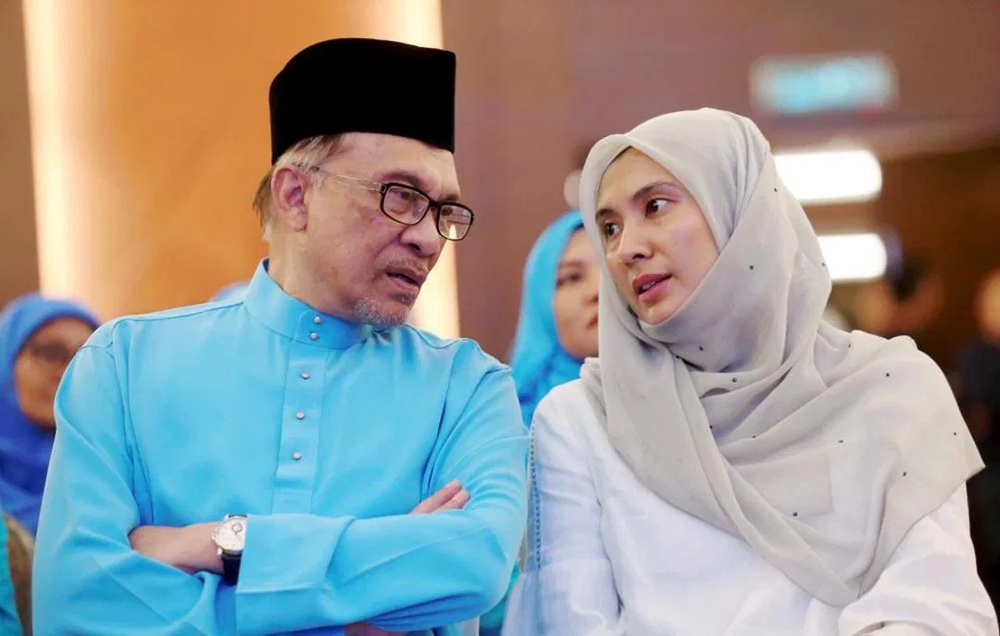
Opinion: "Anwar for the Majority, Nurul for the Minorities?" – A New Strategy for Pakatan Harapan?
7 Jul 2025 • 7:00 AM MYT

TheRealNehruism
Writer. Seeker. Teacher

Image credit: Oriental Daily
Nurul Izzah is a busy woman. Just over a month since winning the PKR elections and becoming the party’s number two, she’s already been entrusted with some serious responsibilities.
Just last week, she urged the Sarawak government to expedite land surveys and ownership approvals for native customary lands, while also calling for a halt to new licences on disputed territories. She pointed out that for communities such as the Iban, Bidayuh, Orang Ulu, and Penan, land is more than a place to live.
“It is their source of livelihood, a place for worship, where they celebrate their customs and raise their families. Most importantly, it is part of their soul and identity.”
Although native customary rights are recognised under federal law and the Sarawak Land Code, Nurul Izzah noted that only a fraction of such lands have been formally surveyed and granted legal ownership.
“Many remain unresolved. As a result, the majority of indigenous communities are vulnerable to encroachment, forced eviction, and exploitation.”
She also criticised the unchecked expansion of oil palm plantations and logging operations, arguing that these developments have often come at the expense of native communities.
“Land is leased to large companies without consultation, without consent, and without proper compensation. This has forced many indigenous people to face serious legal, bureaucratic, and financial challenges just to have their rights recognised.”
“All development must receive free, prior, and informed consent from the land’s original owners, and fair compensation must be given to any affected or displaced community.”
There are two key takeaways from the fact that one of the first issues Nurul Izzah has taken up, since becoming PKR’s number two and the presumptive heir to Anwar, is the matter of native customary land rights in Sarawak.
First, this strongly suggests that she is likely to lead Putrajaya’s upcoming digvijaya (conquest or campaign) in Sarawak. With the Sarawak state elections scheduled for 2027, it is inevitable that the federal government will attempt to engage with — and possibly neutralise — the increasingly assertive GPS-led state administration. From the looks of it, Nurul Izzah is being positioned to spearhead that federal campaign, and native land rights could very well become a major front in that battle.
Second, her tone and choice of issues suggest that Nurul Izzah may be shaping herself as a champion of minorities in Malaysia.
This second point was further underscored today by her remarks about the Indian community in Peninsular Malaysia.
In a press conference on the 13th Malaysia Plan (13MP), Nurul Izzah addressed criticism about her alleged silence on Indian community issues, explaining that she had chosen to work behind the scenes rather than chase headlines.
“For the longest time, I have chosen to work quietly because I believe in substance before spectacle. What matters the most is not how loudly we speak, but whether our work brings change to those who need it the most,” she said, in a speech read by former Klang MP Charles Santiago.
She revealed that over the past year, she had convened a series of expert-led roundtables to address long-standing issues plaguing the Indian B40 group. This has culminated in a proposed Indian Community Development Framework, developed with Yayasan Iltizam Malaysia and over 200 civil society actors.
Key proposals include:
- A national preschool education policy
- Technical and vocational training hubs
- An entrepreneurship incubator for women and youth
A statutory agency to coordinate and deliver aid transparently
As Anwar navigates the treacherous waters of majoritarian politics in Malaysia, it appears that Nurul Izzah has been quietly handed the compass to steer the ship of minority concerns. Is this a calculated political division of labour, or the beginning of a deeper ideological shift within Pakatan Harapan?
Looking at how things are shaping up, I would go so far as to suggest that we may be seeing a strategic division of political labour within the Anwar administration: Anwar for the majority, Nurul for the minorities.
One of the main political dilemmas Anwar has faced since taking power is the disillusionment of the Indian community — ironically, one of his strongest support bases during his years in the political wilderness.
When the leader and party you support finally win, you expect to feel like a winner. But for many Indians, Anwar's victory has not translated into empowerment or visibility. In fact, they’ve felt even more sidelined.
On one hand, it’s hard to blame Anwar. The deteriorating state of race relations in Peninsular Malaysia makes it politically risky for him to be seen favouring any one group. As the smallest major ethnic bloc, openly championing Indian issues could endanger his standing with larger constituencies.
But realpolitik cuts both ways. In a tight election, 6.5% of the electorate — which is roughly the Indian vote share — can make all the difference.
Seen in this light, it makes strategic sense to delegate minority outreach to Nurul Izzah. This move allows Anwar to maintain neutrality at the top, while ensuring his government doesn’t completely alienate communities that were vital to his political resurrection. It also insulates him from accusations of abandoning loyal supporters — a perception that could haunt him in the next general election.
That said, I’m still undecided about how this “Anwar for the majority, Nurul for the minorities” strategy will ultimately play out. It’s an elegant solution on paper — but politics is rarely neat or predictable.
I think I’ll give it a month or two before I say more.
No comments:
Post a Comment